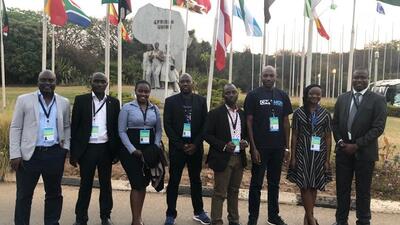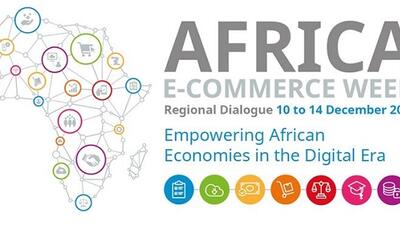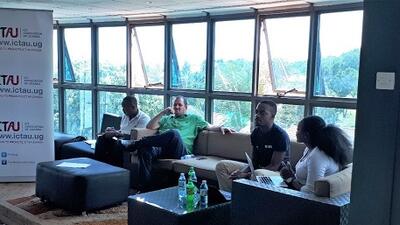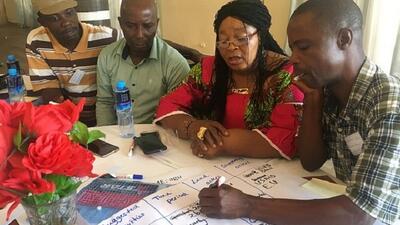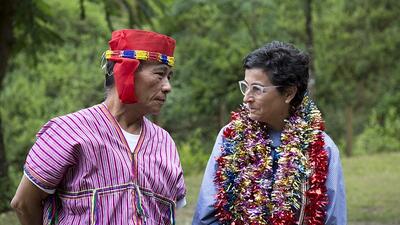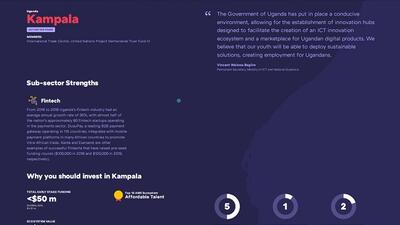Capacity building, training are key to bringing value to Sierra Leone’s cocoa sector (en)
Most efforts to build the capacity of actors in Sierra Leone’s cocoa sector have targeted farmers, helping them boost the volume of their crops. All good and well, say cocoa stakeholders, but it’s now time to focus on quality, especially among cooperatives, buying agencies and exporters.
That was one of the major outcomes of a recent workshop to identify the training needs of cocoa value chain actors – smallholder farmers, traders, agents, cooperatives and exporters. The two-day workshop brought together about 40 stakeholders from national institutions, ministries, cooperatives and farmer groups whose input is being incorporated into a capacity-building strategy that fits within the framework of the International Trade Centre’s (ITC) Netherlands Trust Fund IV (NTF IV) Mano River project.
Participants identified the top capacity-building needs of value chain actors, set training goals and advised which institutions and organizations were best suited to offer training.
‘The areas targeted are critical in the overall quality enhancement and improved productivity in the sector,’ said Osman Alpha Kargbo, produce quality officer at the Produce Monitoring Board. ‘As a board charged with the responsibility of ensuring the production, processing and marketing of high-quality cocoa beans, we saw the training needs assessment as valuable, timely and in the right direction.’
Training has been absent for buying agents, exporters
Cocoa exporters and buying agents in Sierra Leone have never received training to broaden their skills. Workshop participants recommended that efforts to build capacity in the sector should focus on these actors.
Quality control is the No. 1 capacity-building priority for both buying agents and exporters. Quality-control training would enable agents to identify defects, grade cocoa beans according to international standards, properly store and dry beans, use scales correctly and fairly, and advise and support farmers to improve the quality of their cocoa. Exporters would learn how to grade and dry cocoa beans and recognize quality parameters according to international standards, train their staff to apply quality-control measures, maintain proper storage and transportation conditions, and provide quality-control tools to agents, traders and cooperatives.
Buying agents also need better marketing and business skills so they can keep proper records, understand the dynamics and structure of the cocoa market, improve their financial management, negotiate contracts and fixed prices, and inform farmers about market trends.
Exporters, workshop participants concluded, require training about standards and accessing global market. This would help them comply with these standards, enter international markets, recognize market opportunities, understand foreign trade policy on cocoa, negotiate contracts and calculate costs and pricing.
Three workshop participants pinpointed corporate, social and environmental responsibility as another priority area that would enable exporters to provide materials and financial support to boost farmers’ production and support community development. Exporters could be trained along with agents and traders, and possibly cooperatives, they said.
Cooperatives need training on certification, quality management
Training on certification and quality management to reach export quality are among the main needs of cocoa cooperatives, participants found. Participants noted that ‘it could potentially be interesting to raise awareness of the benefits, requirements and constraints of certification schemes to help cooperatives make decisions to enter such schemes’.
Another recommendation was for cooperatives to receive training on quality management for exporting together with traders and exporters.
‘I was very happy to learn a lot about all training needs for cooperatives,’ said Ibrahim Moseray, chairman of Kpeya, an association of Sierra Leonean cocoa farmers. ‘The workshop was very important to Kpeya as it focused on trainings to improve the quality and commercialization of cocoa along the value chain through a certification scheme.’
Kpeya’s involvement in sustainable certification activities could eventually mean higher prices for Sierra Leonean cocoa exports, Moseray says. ‘This will lead to poverty reduction of our members and the development of their production areas,’ he explained.
Fourteen participants said cooperatives also require more governance skills – meaning more accountability, democratic elections and transparent financial management – and that they cannot export directly because they are not sustainable. However, such issues are outside the scope of NTF IV training.
Farmers need training to improve production, processing
Building production and processing capacity is the top priority for farmers, according to workshop participants. They also said farmers need to improve their business skills, from recordkeeping and financial management to understanding how to market themselves.
Existing projects in Sierra Leone funded by Welthungerhilfe and German development agency GIZ already address these needs. Both initiatives also have a well-established and trusted network of certified trainers, and workshop participants agreed that there was no need to replicate these programmes.
But they did have some suggestions, such as using GIZ’s network of trainers and creating leaflets and folders to reach more farmers.
The workshop also supported the adoption of best practices for cocoa fermentation. Participants recommended introducing practices that enable farmers to properly ferment cocoa beans to ensure high quality and added value.
To complement existing training packages and services, ITC intends to prepare education and communication materials on important post-harvest practices, including fermentation. In addition, ITC will design and develop modules on quality management and international market standards and access.
NTF IV is based on a partnership between ITC and the Dutch Centre for the Promotion of Imports from developing countries (CBI). The Mano River project seeks to increase the competitiveness of small and medium-sized cocoa enterprises in Sierra Leone, Liberia and Guinea by improving value chain linkages and trading to create more value in a sustainable manner.





